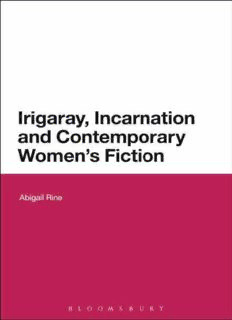Table Of ContentIrigaray, Incarnation and
Contemporary Women’s Fiction
Also available from Bloomsbury
Breathing with Luce Irigaray, edited by Lenart Skof and Emily A. Holmes
In the Beginning, She Was, Luce Irigaray
Luce Irigaray: Key Writings, Luce Irigaray
Luce Irigaray: Teaching, Luce Irigaray
Scenes of Intimacy: Reading, Writing and Theorizing Contemporary
Literature, edited by, Jennifer Cooke
Irigaray, Incarnation and
Contemporary Women’s Fiction
Abigail Rine
LONDON • NEW DELHI • NEW YORK • SYDNEY
Bloomsbury Academic
An imprint of Bloomsbury Publishing Plc
50 Bedford Square 1385 Broadway
London New York
WC1B 3DP NY 10018
UK USA
www.bloomsbury.com
First published 2013
© Abigail Rine, 2013
All rights reserved. No part of this publication may be reproduced or
transmitted in any form or by any means, electronic or mechanical,
including photocopying, recording or any information storage or retrieval
system, without prior permission in writing from the publishers.
Abigail Rine has asserted her right under the Copyright, Designs and
Patents Act, 1988, to be identified as Author of this work.
No responsibility for loss caused to any individual or organization acting on
or refraining from action as a result of the material in this publication can be
accepted by Bloomsbury Academic or the author.
British Library Cataloguing-in-Publication Data
A catalogue record for this book is available from the British Library.
ISBN: HB: 978-1-7809-3598-0
ePub: 978-1-4725-0866-9
PDF: 978-1-4725-1452-3
Library of Congress Cataloging-in-Publication Data
A catalog record for this book is available from the Library of Congress.
Typeset by Deanta Global Publishing Services, Chennai, India
For Michael & Julian
vi
Contents
Acknowledgements ix
Abbreviations xi
Introduction 1
1 Becoming Incarnate: Luce Irigaray on Religion 11
Irigaray and the divine 11
Irigaray and incarnation 19
Literature as incarnated writing 22
2 Where Literature, Religion and Feminism Meet: Critical
Perspectives 35
Women’s revisionist writing 35
Breaking new ground 46
3 ‘In Love with Either/Or’: Religion and Oppositional Logic in
Margaret Atwood’s The Handmaid’s Tale 53
Opposites that tear the world apart 55
Bodies and word(s) 60
Chaste vessels and unholy harlots 66
The Gilead within 71
Conclusion 78
4 ‘Where God Begins’: Reconciling the Female Body
and the Divine Word in Michèle Roberts’ The Book of
Mrs Noah and Impossible Saints 85
‘The Word that structures difference’ 86
Subjecting the flesh 91
Incarnating new words 100
Rejection, revision, renewal 106
Conclusion 112
viii Contents
5 ‘Sucked into the Black Cloth’: Religion, Race and Sexual Shame
in Alice Walker’s By the Light of My Father’s Smile 117
Religion as an imperialist force 118
The wound of sexual shame 123
The healing spirit of Eros 129
Conclusion 136
6 ‘Your Father Who is Tender Like a Furnace’: Divinity,
Violence and Desire in A. L. Kennedy’s Original Bliss 143
Someone to make her whole 143
Helen and the apple 147
The ‘palpable gift’ of God’s judgement 152
Coming to our senses 155
Conclusion 160
Conclusion 165
Bibliography 171
Index 181
Acknowledgements
I have many people to thank. First, my gratitude to Professor Luce Irigaray
for illuminating her theories for me and for providing invaluable feedback on
this research. Her writing and mentorship have profoundly influenced me,
both intellectually and personally. Many thanks, as well, to the women of Luce
Irigaray’s 2008 Doctoral Seminar, whose collective, collaborative brilliance fed
my soul and my work.
My deepest gratitude to my PhD supervisors at the University of St Andrews,
Professor Susan Sellers and Professor Gill Plain, who guided, mentored and
encouraged me through my PhD work, from which this current project springs.
I am also indebted to my friends and former St Andrews colleagues, Dr Ben
Davies and Dr Susan Massey: Ben, for the wine, stinky cheese and entertaining
conversation, and Susan, for the endless cups of Yorkshire gold.
I would also like to acknowledge my friends and current colleagues in the
English Department at George Fox University: Bill Jolliff, Melanie Mock, Kathy
Heininge, Gary Tandy and Ed Higgins. These folks have guided me through my
initial years as a teacher and scholar, and I could not ask for better colleagues.
I am extremely grateful to have these people in my life. Several other George
Fox colleagues also contributed to this undertaking, namely the members of my
dynamic writing group, Kathy Heininge and Corey Beals, whose fingerprints are
all over this book. Their insight and feedback have continually challenged me
as a writer, reader and thinker. I have been similarly encouraged and motivated
by my new faculty buddies, Brian Doak, Patrick Ray and Davida Brown; their
camaraderie and support have been instrumental throughout the writing and
revision process. I would also like to acknowledge Mark McLeod-Harrison, who
first introduced me to feminism, and who recently let me take the reins of his
Feminist Philosophy class, where I was able to present some of the central ideas
of this book. And thanks to my students, past and present, who daily challenge
and delight me – particularly the Red Couch Women.
Lastly, I wish to thank those in my inner circle: my father, Ric, who instilled
in me ‘The Rhino Principle’, and my mother, Becky, who taught me the sweetness
of stories and words. They have given me more than I can ever repay. Thanks
Description:Drawing on the provocative recent work of feminist theorist Luce Irigaray, Irigaray, Incarnation and Contemporary Women's Fiction illuminates the vital and subversive role of literature in rewriting notions of the sacred. Abigail Rine demonstrates through careful readings how a range of contemporary

